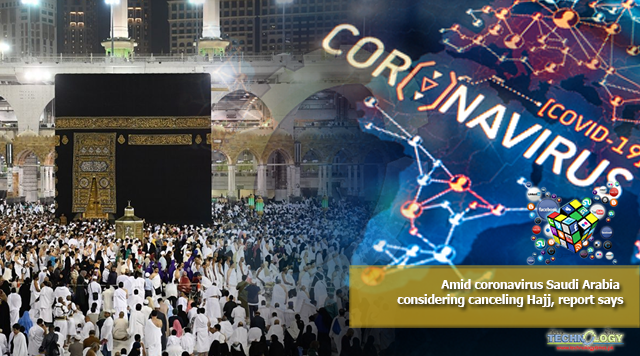Saudi Arabia is considering canceling the annual Hajj pilgrimage this year because of the coronavirus pandemic. About 2 million people performed hajj rituals every year.

Saudi Arabia is considering canceling the annual hajj pilgrimage this year because the coronavirus pandemic, the Financial Times reported.
The hajj, which involves traveling to the holy city of Mecca in Saudi Arabia, is a mandatory ritual for all observant Muslims who can afford the trip and physically complete the journey at least once in their lifetime. One of the largest religious gatherings in the world, hajj draws about 2 million people to Saudi Arabia each year.
Indonesia, Singapore, Malaysia and Brunei have decided not to take part in pilgrimage this year in Saudi Arabia as the world grapples with coronavirus pandemic.
Following the postponement of other major events like the Tokyo 2020 Olympics, Saudi officials have faced pressure to cancel this year’s Hajj to help curb the spread of the coronavirus, the report said.
Officials are considering different scenarios and a “decision will be made within one week,” a senior official from the Saudi Ministry of Hajj and Umrah ministry told the newspaper.
It is pertinent to mention that Hajj cancellation wouldn’t be the first, plague, war and politics disrupted pilgrimages long before coronavirus.
Firts time, the hajj interrupted in A.D. 930 due to armed conflict. In another political dispute, the pilgrimage was terminated in A.D. 983.
Much like the present, diseases and other natural calamities have also come in the way of the pilgrimage.
There are reports that the first time an epidemic of any kind caused hajj to be canceled was an outbreak of plague in A.D. 967. And drought and famine caused the Fatimid ruler to cancel overland Hajj routes in A.D. 1048.
Indeed, for much of the 19th century and the beginning of the 20th century, cholera remained a “perennial threat” and caused frequent disruption to the annual hajj.
In more recent years, too, the pilgrimage has been disrupted for many similar reasons.
In 2012 and 2013 Saudi authorities encouraged the ill and the elderly not to undertake the pilgrimage amid concerns over Middle East Respiratory Syndrome, or MERS.
This year the event is supposed to take place from July 29 to Aug. 4, but Saudi Arabia has yet to lift an international travel ban implemented on May 20. Other countries have already declined to send pilgrims this year.
The kingdom experienced a spike in coronavirus cases and deaths after loosening lockdown measures, the report said. Saudi Arabia has reported more than 119,000 confirmed cases of Covid-19 and 893 deaths, according to data from Johns Hopkins University.
The Saudi Ministry of Hajj and Umrah did not immediately reply to a request for comment.